15 may 2016 Page 2
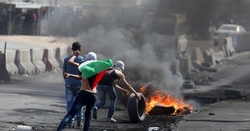
Dozens of Palestinian citizens on Sunday suffered from inhaling tear gas after the Israeli occupation forces (IOF) attacked a festival in al-Fawwar refugee camp, south of al-Khalil city.
Eyewitnesses told the Palestinian Information Center (PIC) that Israeli soldiers at the northern entrance to the camp attacked a festival held by activists to commemorate the 68th anniversary of the Palestinian Nakba (catastrophe).
They explained that the soldiers showered the hall, where the festival took place, with volleys of tear gas grenades, amid intensive gunfire.
Afterwards, the soldiers closed the northern entrance to the camp after dozens of attendees, including a girl child, suffocated by the gas smoke, according to the eyewitnesses.
Consequently, violent clashes broke out between local young men and soldiers at the entrance to the camp. In a separate incident on the same day, IOF soldiers quelled the "Train of Return" march organized in the afternoon in Bethlehem city to mark the Nakba Day.
The PIC reporter in the city said that Israeli troops fired a hail of tear gas grenades at the participants in the march upon their arrival at the northern entrance to Bethlehem. Several citizens suffered from inhaling tear gas.
"The Train of Return" was made by volunteers from the three refugee camps in Bethlehem city for the march. Demonstrators were waving both Palestinian and the black "right of return" flags and singing national songs while marching with the train through the city.
While most of the marchers stopped after they reached a main intersection in the city, more than one hundred others, along with the train, continued down the road to a military post that lies just behind Israel’s separation wall and clashed with IOF soldiers there.
Eyewitnesses told the Palestinian Information Center (PIC) that Israeli soldiers at the northern entrance to the camp attacked a festival held by activists to commemorate the 68th anniversary of the Palestinian Nakba (catastrophe).
They explained that the soldiers showered the hall, where the festival took place, with volleys of tear gas grenades, amid intensive gunfire.
Afterwards, the soldiers closed the northern entrance to the camp after dozens of attendees, including a girl child, suffocated by the gas smoke, according to the eyewitnesses.
Consequently, violent clashes broke out between local young men and soldiers at the entrance to the camp. In a separate incident on the same day, IOF soldiers quelled the "Train of Return" march organized in the afternoon in Bethlehem city to mark the Nakba Day.
The PIC reporter in the city said that Israeli troops fired a hail of tear gas grenades at the participants in the march upon their arrival at the northern entrance to Bethlehem. Several citizens suffered from inhaling tear gas.
"The Train of Return" was made by volunteers from the three refugee camps in Bethlehem city for the march. Demonstrators were waving both Palestinian and the black "right of return" flags and singing national songs while marching with the train through the city.
While most of the marchers stopped after they reached a main intersection in the city, more than one hundred others, along with the train, continued down the road to a military post that lies just behind Israel’s separation wall and clashed with IOF soldiers there.
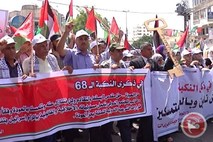
Thousands of Palestinians took part Sunday in a rally in Gaza City organized by various political factions to commemorate the 68th anniversary of the Nakba, or catastrophe, voicing renewed demands that Palestinians to return to the cities, villages, and lands that they were forced to leave in 1948 during the creation of the state of Israel.
Waving Palestine flags, the participants marched from the Unknown Soldier Square to the headquarters of the United Nations.
“Sixty-eight years have passed since the Nakba and our people have never forgotten their homeland, Palestine. We will return,” Fatah member Zakariyya al-Agha said during the rally.
“Let the whole world know that our people will never accept an alternative to this homeland [...] no matter how far the distances or how high the occupier’s walls are,” al-Agha said.
He added that all Palestinian factions should close ranks and maintain national unity because “(unity) is the bridge to Palestine and the line of defense in the face of all challenges and obstacles.”
Al-Agha urged the Palestinian leadership to carry out parliamentarian and presidential elections and restructure the PLO to more effectively defend the Palestinian people. A unified Palestinian government, he added, should aim expose the crimes of the Israeli occupation in all international courts in order to return Palestinian land to its rightful owners.
Senior leader of the PLO’s main leftist faction the Popular Front for the Liberation of Palestine (PFLP) Jamil Mizhir echoed al-Agha’s comments, calling for national unity and restructuring the PLO: “Let us hold fast to our land, to the right of return, and to resistance -- one generation after the other. We must take advantage of this memory to end rivalries.”
Samir Abu Mudalla, representing the PLO’s other leftist faction the Democratic Front for the Liberation of Palestine (DFLP), also spoke of Palestinians’ right to return to their homes and villages inside present-day Israel.
“A Palestinian holder of European nationality still dreams of returning to the land of their fathers and grandfathers,” Mudalla said, urging rival factions Hamas and Fatah to take advantage of the memory of the Nakba to end their “odious” disputes.
The Hamas movement reiterated in a statement on Sunday that it would never recognize "the Israeli occupation state," nor would it relinquish a "whit" of Palestinian land.
The Palestinian people have broken the image of the "undefeatable" Israeli soldier, liberated Gaza from Israeli presence and withstood three fierce wars against the besieged coastal enclave, the statement added.
Hamas further urged "the loyal people within Fatah and other Palestinian factions" to oppose security coordination with Israel as well as the "oppression and politically-motivated arrests in the West Bank."
The statement also called upon Fatah to "respond positively to the hand extended for reconciliation so as to go ahead with resistance and liberation of people and land."
Fatah and Hamas have been pitched against one another since Hamas won legislative elections in 2006 and subsequently fought its way to power in the Gaza Strip. A new round of reconciliation talks began in Qatar earlier this year, and senior delegations from the rival Palestinian factions met in April in Gaza City.
Later on Sunday afternoon, clashes broke out between Israeli forces and Palestinian protesters on the eastern outskirts of Gaza City.
Israeli troops fired tear gas canisters at participants in the rally, who were standing across the border fence from the Israeli kibbutz of Nahal Oz. No casualties have been reported.
An Israeli army spokesperson said they were looking into the reports.
The rally was organized by a Gaza-based group called “Coalition of the Intifada,” which emerged in recent months. The group said in a statement that “the right of return is a sacred inalienable right at individual and collective levels, and nobody has the right to abandon that right or bargain it under any circumstances.”
“Our people refuse the erasure of our national identity and the attempts to make us desperate through restrictions, oppression and deprivation of our simplest human rights,” the group added.
Waving Palestine flags, the participants marched from the Unknown Soldier Square to the headquarters of the United Nations.
“Sixty-eight years have passed since the Nakba and our people have never forgotten their homeland, Palestine. We will return,” Fatah member Zakariyya al-Agha said during the rally.
“Let the whole world know that our people will never accept an alternative to this homeland [...] no matter how far the distances or how high the occupier’s walls are,” al-Agha said.
He added that all Palestinian factions should close ranks and maintain national unity because “(unity) is the bridge to Palestine and the line of defense in the face of all challenges and obstacles.”
Al-Agha urged the Palestinian leadership to carry out parliamentarian and presidential elections and restructure the PLO to more effectively defend the Palestinian people. A unified Palestinian government, he added, should aim expose the crimes of the Israeli occupation in all international courts in order to return Palestinian land to its rightful owners.
Senior leader of the PLO’s main leftist faction the Popular Front for the Liberation of Palestine (PFLP) Jamil Mizhir echoed al-Agha’s comments, calling for national unity and restructuring the PLO: “Let us hold fast to our land, to the right of return, and to resistance -- one generation after the other. We must take advantage of this memory to end rivalries.”
Samir Abu Mudalla, representing the PLO’s other leftist faction the Democratic Front for the Liberation of Palestine (DFLP), also spoke of Palestinians’ right to return to their homes and villages inside present-day Israel.
“A Palestinian holder of European nationality still dreams of returning to the land of their fathers and grandfathers,” Mudalla said, urging rival factions Hamas and Fatah to take advantage of the memory of the Nakba to end their “odious” disputes.
The Hamas movement reiterated in a statement on Sunday that it would never recognize "the Israeli occupation state," nor would it relinquish a "whit" of Palestinian land.
The Palestinian people have broken the image of the "undefeatable" Israeli soldier, liberated Gaza from Israeli presence and withstood three fierce wars against the besieged coastal enclave, the statement added.
Hamas further urged "the loyal people within Fatah and other Palestinian factions" to oppose security coordination with Israel as well as the "oppression and politically-motivated arrests in the West Bank."
The statement also called upon Fatah to "respond positively to the hand extended for reconciliation so as to go ahead with resistance and liberation of people and land."
Fatah and Hamas have been pitched against one another since Hamas won legislative elections in 2006 and subsequently fought its way to power in the Gaza Strip. A new round of reconciliation talks began in Qatar earlier this year, and senior delegations from the rival Palestinian factions met in April in Gaza City.
Later on Sunday afternoon, clashes broke out between Israeli forces and Palestinian protesters on the eastern outskirts of Gaza City.
Israeli troops fired tear gas canisters at participants in the rally, who were standing across the border fence from the Israeli kibbutz of Nahal Oz. No casualties have been reported.
An Israeli army spokesperson said they were looking into the reports.
The rally was organized by a Gaza-based group called “Coalition of the Intifada,” which emerged in recent months. The group said in a statement that “the right of return is a sacred inalienable right at individual and collective levels, and nobody has the right to abandon that right or bargain it under any circumstances.”
“Our people refuse the erasure of our national identity and the attempts to make us desperate through restrictions, oppression and deprivation of our simplest human rights,” the group added.
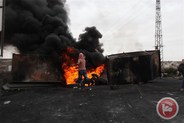
Palestinian security officers on Sunday prevented dozens of Palestinian demonstrators commemorating Nakba Day from reaching an Israeli military checkpoint near the illegal settlement of Beit El north of Ramallah in the occupied West Bank.
Dozens of young men marched in the main street of the town of al-Bireh near Ramallah to mark the 68th anniversary of the Nakba, or catastrophe, when more than 750,000 Palestinians were pushed into exile or driven out of their homes in the conflict surrounding Israel's creation in 1948.
The protesters, who were reportedly burning tires in the street, were stopped by Palestinian security officers as they came close to the Israeli military checkpoint, and were forced to step back.
Palestinian security forces have tried to tamp down on Palestinian demonstrations near Israeli military positions in the past several weeks, amid renewed anger in Palestinian society regarding the Palestinian Authority’s security coordination with Israel since the Oslo Accords.
An estimated five million Palestinians are descendants of those affected by the Nakba, living in refugee camps in the occupied West Bank or abroad. The anniversary of the Nakba is commemorated annually on May 15.
Dozens of young men marched in the main street of the town of al-Bireh near Ramallah to mark the 68th anniversary of the Nakba, or catastrophe, when more than 750,000 Palestinians were pushed into exile or driven out of their homes in the conflict surrounding Israel's creation in 1948.
The protesters, who were reportedly burning tires in the street, were stopped by Palestinian security officers as they came close to the Israeli military checkpoint, and were forced to step back.
Palestinian security forces have tried to tamp down on Palestinian demonstrations near Israeli military positions in the past several weeks, amid renewed anger in Palestinian society regarding the Palestinian Authority’s security coordination with Israel since the Oslo Accords.
An estimated five million Palestinians are descendants of those affected by the Nakba, living in refugee camps in the occupied West Bank or abroad. The anniversary of the Nakba is commemorated annually on May 15.
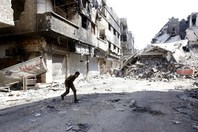
A street in Yarmouk refugee camp in the Syrian capital Damascus in 2013
As Palestinians worldwide mark the 68th anniversary of the Nakba, or "catastrophe" that occurred during the establishment of the state of Israel, on Sunday, Palestinian refugees displaced a second time by civil war in Syria remained under siege and under threat by ongoing armed fighting.
Some 12,000 people, including 3,000 children, have reportedly been trapped in the besieged Palestinian refugee camp of Khan al-Shih near Damascus, amid heavy shelling, barrel bombs, and sniper fire that bombarded the area in recent days, international aid organization Save the Children reported on Friday.
After hostilities escalated, the last remaining road into the camp was shut, blocking essential supplies from entering the increasingly vulnerable refugee population. The camp had been under a partial Syrian regime-imposed siege since 2013.
According to Save the Children, three youths were reportedly shot dead trying to escape the blockaded camp.
The press release quoted the head of Save the Children’s Syria program as saying: “Despite the supposed ceasefire across the country, people are living in terror of siege and bombardment. People in Khan al-Shih tell us that most medicine, fuel, and flour has almost run out, and food prices have doubled in the past few days.”
The situation was only expected to get worse, she added. “The roads and access to the camp must urgently be reopened and vital humanitarian aid immediately allowed in.”
The report added that only one doctor and one dentist were believed to remain in the camp, but a lack of medicine, equipment, and electricity prevented them from adequately treating their patients.
The situation in another Damascus-area Palestinian refugee camp Yarmouk has also continued to deteriorate, after weeks of fighting and a newly established checkpoint cut of food and water supplies to reach the dwindling population, of what was once the largest Palestinian refugee camp in Syria.
Renewed violence in Yarmouk in April between the Islamic State and al-Nusra Front left thousands of Palestinians trapped in their homes, accompanied by heavy shelling from Syrian regime forces as well as armed Palestinian groups.
At least four civilians were killed in the hostilities as of mid-April -- including two who were beheaded by IS fighters. Another five civilians, including children, were wounded by sniper fire. Some 20 buildings were also burned in the round of fighting, including a hospital.
Humanitarian aid delivery to the camp has been nearly impossible over the past three years. The estimated 5,000 to 8,000 residents remaining in Yarmouk must travel to adjacent areas to access distribution of food and hygiene materials.
Khan al-Shih and Yarmouk are among areas of active conflict where tens of thousands of Palestinian refugees have been concentrated, in addition to Muzeirib and Jillin in the southwestern city of Deraa.
After a visit to the Damascus area this week, the commissioner-general for UNRWA said the UN agency's staff were "doing their utmost to provide crucial assistance and services to Palestine refugees."
"It is essential that their destiny, their plight, as well as their needs and expectations are not forgotten. Addressing these should be a priority for all," he added.
The Syrian conflict began in the form of peaceful protests in March 2011 and quickly morphed into a civil war, leaving more than 300,000 people dead and millions displaced since.
Over half a million Palestinians lived across nine refugee camps in Syria prior to the war, the descendants of some of the 750,000 Palestinians expelled from their homes during the establishment of Israel in 1948.
Syria's civil war has seen many of these families displaced a second time, and around 50,000 Palestinians have fled the country --the majority to Lebanon and more than 17,000 to Jordan.
According to UN documentation, some 450,000 of the 560,000 refugees registered in Syria remain in the country, 280,000 of them internally displaced. Ninety-five percent of the remaining Palestinian refugees in Syria are in need of sustained humanitarian assistance.
As Palestinians worldwide mark the 68th anniversary of the Nakba, or "catastrophe" that occurred during the establishment of the state of Israel, on Sunday, Palestinian refugees displaced a second time by civil war in Syria remained under siege and under threat by ongoing armed fighting.
Some 12,000 people, including 3,000 children, have reportedly been trapped in the besieged Palestinian refugee camp of Khan al-Shih near Damascus, amid heavy shelling, barrel bombs, and sniper fire that bombarded the area in recent days, international aid organization Save the Children reported on Friday.
After hostilities escalated, the last remaining road into the camp was shut, blocking essential supplies from entering the increasingly vulnerable refugee population. The camp had been under a partial Syrian regime-imposed siege since 2013.
According to Save the Children, three youths were reportedly shot dead trying to escape the blockaded camp.
The press release quoted the head of Save the Children’s Syria program as saying: “Despite the supposed ceasefire across the country, people are living in terror of siege and bombardment. People in Khan al-Shih tell us that most medicine, fuel, and flour has almost run out, and food prices have doubled in the past few days.”
The situation was only expected to get worse, she added. “The roads and access to the camp must urgently be reopened and vital humanitarian aid immediately allowed in.”
The report added that only one doctor and one dentist were believed to remain in the camp, but a lack of medicine, equipment, and electricity prevented them from adequately treating their patients.
The situation in another Damascus-area Palestinian refugee camp Yarmouk has also continued to deteriorate, after weeks of fighting and a newly established checkpoint cut of food and water supplies to reach the dwindling population, of what was once the largest Palestinian refugee camp in Syria.
Renewed violence in Yarmouk in April between the Islamic State and al-Nusra Front left thousands of Palestinians trapped in their homes, accompanied by heavy shelling from Syrian regime forces as well as armed Palestinian groups.
At least four civilians were killed in the hostilities as of mid-April -- including two who were beheaded by IS fighters. Another five civilians, including children, were wounded by sniper fire. Some 20 buildings were also burned in the round of fighting, including a hospital.
Humanitarian aid delivery to the camp has been nearly impossible over the past three years. The estimated 5,000 to 8,000 residents remaining in Yarmouk must travel to adjacent areas to access distribution of food and hygiene materials.
Khan al-Shih and Yarmouk are among areas of active conflict where tens of thousands of Palestinian refugees have been concentrated, in addition to Muzeirib and Jillin in the southwestern city of Deraa.
After a visit to the Damascus area this week, the commissioner-general for UNRWA said the UN agency's staff were "doing their utmost to provide crucial assistance and services to Palestine refugees."
"It is essential that their destiny, their plight, as well as their needs and expectations are not forgotten. Addressing these should be a priority for all," he added.
The Syrian conflict began in the form of peaceful protests in March 2011 and quickly morphed into a civil war, leaving more than 300,000 people dead and millions displaced since.
Over half a million Palestinians lived across nine refugee camps in Syria prior to the war, the descendants of some of the 750,000 Palestinians expelled from their homes during the establishment of Israel in 1948.
Syria's civil war has seen many of these families displaced a second time, and around 50,000 Palestinians have fled the country --the majority to Lebanon and more than 17,000 to Jordan.
According to UN documentation, some 450,000 of the 560,000 refugees registered in Syria remain in the country, 280,000 of them internally displaced. Ninety-five percent of the remaining Palestinian refugees in Syria are in need of sustained humanitarian assistance.
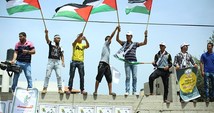
The Israeli Occupation Forces (IOF) brutally suppressed Gaza Nakba rally organized on Sunday east of Gaza City marking the 68th anniversary of the Palestinian Nakba (catastrophe).
Israeli forces fired teargas bombs at hundreds of Palestinian youths who gathered east of Shujayya neighborhood east of Gaza City while on their way to reach the Nahal Oz Israeli military site.
No injuries were initially reported during the attack. The youths responded by throwing stones at the Israeli soldiers stationed at the military site, and managed to raise the Palestinian flag at the border fence.
Israeli forces have recently intensified their presence along the border of Gaza. Gaza rally came as millions of Palestinians and rights activists commemorate the Palestinian Nakba (catastrophe), when some 750,000 Palestinians were expelled from their lands in 1948 at gunpoint by Zionist gangs and remain scattered across refugee camps in the West Bank, the Gaza Strip, Jordan, Lebanon, Syria, and Iraq.
Nearly 531 Palestinian towns and cities were destroyed during the Nakba while 15,000 Palestinians were killed at the hands of Zionist gangs to pave the way for the establishment of Israel.
Israeli forces fired teargas bombs at hundreds of Palestinian youths who gathered east of Shujayya neighborhood east of Gaza City while on their way to reach the Nahal Oz Israeli military site.
No injuries were initially reported during the attack. The youths responded by throwing stones at the Israeli soldiers stationed at the military site, and managed to raise the Palestinian flag at the border fence.
Israeli forces have recently intensified their presence along the border of Gaza. Gaza rally came as millions of Palestinians and rights activists commemorate the Palestinian Nakba (catastrophe), when some 750,000 Palestinians were expelled from their lands in 1948 at gunpoint by Zionist gangs and remain scattered across refugee camps in the West Bank, the Gaza Strip, Jordan, Lebanon, Syria, and Iraq.
Nearly 531 Palestinian towns and cities were destroyed during the Nakba while 15,000 Palestinians were killed at the hands of Zionist gangs to pave the way for the establishment of Israel.
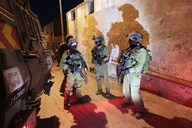
Israeli forces raided multiple neighborhoods across the occupied West Bank overnight Saturday, detaining at least three Palestinians, launching tear gas canisters and stun grenades, and setting fire to olive trees, as Palestinians around the world commemorated the 68th anniversary of the Nakba.
In the northern district of Qalqiliya, dozens of Palestinians suffered from tear gas inhalation, and several trees caught fire when clashes erupted between local youths and Israeli forces in the village of Kafr Qaddum.
Coordinator for a popular resistance committee in the village Murad Shtewi said the Israeli army "turned Kafr Qaddum's sky into a cloud of poisonous gas" after firing tear gas heavily and randomly. Dozens of olive trees in the area caught fire from Israeli forces-fired tear gas and stun grenades.
Shtewi added that civil defense vehicles were prevented from reaching the fire because Israeli forces had closed the roads with dirt berms, forcing firefighters to walk up a hill to control the fire.
To the south in the occupied West Bank district of Hebron, Israeli forces raided the downtown, al-Khila, and al-Thahir areas of the village of Beit Ummar, detaining one Palestinian.
Local activist Muhammad Ayyad Awad said Israeli forces raided the house of Ibrahim Abd-al-Hamid Abu Maria, and detained his son Abd Nasir, 19.
In the southern district of Bethlehem, abnormally excessive use of force by Israeli forces was reported during an overnight raid in al-Azza refugee camp.
Locals reported a night of chaos marked by at least three explosions and two sets of exchange of fire while Israeli forces showered the camp with tear gas.
An Israeli army spokesperson told Ma’an Israeli forces detained two Palestinians near Bethlehem and one next to Ramallah in the occupied West Bank overnight. She added she was looking into the reports of clashes in al-Azza and Kafr Qaddum.
Saturday night’s raids come as Palestinians around the world commemorated the 68th anniversary of the beginning of the Nakba, or catastrophe, when 750,000 Palestinians were forcibly displaced during the creation of the state of Israel.
Many perceive the 1948 atrocities -- marked by the destruction of 531 Palestinian towns and villages as well as 33 massacres by Israel -- as just the beginning of a Nakba that has continued unabated to this day.
“Since 1948, Israel has employed deliberate and systematic acts of violence, colonialism, and destruction at the expense of the Palestinian people, their rights, lands, and resources,” Senior PLO official Hanan Ashrawi said in a press release published Saturday titled, “The Nakba continues.”
Israel’s systematic dispossession and forced displacement of the Palestinian people entered a new era in 1967 when Israel illegally occupied the West Bank and East Jerusalem, creating another 430,000 Palestinian refugees, according to the PLO.
The decades-long occupation of the Palestinian territory is marked by near-nightly raids by Israeli forces into Palestinian-controlled areas of the West Bank, with more than 90 search and arrest operations conducted per week since the start of the year, according to UN documentation.
In the northern district of Qalqiliya, dozens of Palestinians suffered from tear gas inhalation, and several trees caught fire when clashes erupted between local youths and Israeli forces in the village of Kafr Qaddum.
Coordinator for a popular resistance committee in the village Murad Shtewi said the Israeli army "turned Kafr Qaddum's sky into a cloud of poisonous gas" after firing tear gas heavily and randomly. Dozens of olive trees in the area caught fire from Israeli forces-fired tear gas and stun grenades.
Shtewi added that civil defense vehicles were prevented from reaching the fire because Israeli forces had closed the roads with dirt berms, forcing firefighters to walk up a hill to control the fire.
To the south in the occupied West Bank district of Hebron, Israeli forces raided the downtown, al-Khila, and al-Thahir areas of the village of Beit Ummar, detaining one Palestinian.
Local activist Muhammad Ayyad Awad said Israeli forces raided the house of Ibrahim Abd-al-Hamid Abu Maria, and detained his son Abd Nasir, 19.
In the southern district of Bethlehem, abnormally excessive use of force by Israeli forces was reported during an overnight raid in al-Azza refugee camp.
Locals reported a night of chaos marked by at least three explosions and two sets of exchange of fire while Israeli forces showered the camp with tear gas.
An Israeli army spokesperson told Ma’an Israeli forces detained two Palestinians near Bethlehem and one next to Ramallah in the occupied West Bank overnight. She added she was looking into the reports of clashes in al-Azza and Kafr Qaddum.
Saturday night’s raids come as Palestinians around the world commemorated the 68th anniversary of the beginning of the Nakba, or catastrophe, when 750,000 Palestinians were forcibly displaced during the creation of the state of Israel.
Many perceive the 1948 atrocities -- marked by the destruction of 531 Palestinian towns and villages as well as 33 massacres by Israel -- as just the beginning of a Nakba that has continued unabated to this day.
“Since 1948, Israel has employed deliberate and systematic acts of violence, colonialism, and destruction at the expense of the Palestinian people, their rights, lands, and resources,” Senior PLO official Hanan Ashrawi said in a press release published Saturday titled, “The Nakba continues.”
Israel’s systematic dispossession and forced displacement of the Palestinian people entered a new era in 1967 when Israel illegally occupied the West Bank and East Jerusalem, creating another 430,000 Palestinian refugees, according to the PLO.
The decades-long occupation of the Palestinian territory is marked by near-nightly raids by Israeli forces into Palestinian-controlled areas of the West Bank, with more than 90 search and arrest operations conducted per week since the start of the year, according to UN documentation.
|
|
A "Return Train" traveled through the occupied West Bank district of Bethlehem Sunday morning, as a symbolic demonstration of the right of Palestinian refugees to return to the homes and villages they were forcibly displaced from 68 years ago during the creation of Israel.
The train embarked from al-Duheisha refugee camp at 11 a.m., heading towards the city of Jerusalem. Munthir Amira, member of an international rights network dedicated to refugees and displaced peoples, told Ma’an the concept behind the train was "to mimic our 68-year dream of returning." Amira said that the train was formed by four carriages, each representing names of displaced villages and refugee camps. |
He added that the train was built with 1.5 tons of iron, wood, and a generator to run it. It took a week to complete.
Al-Duheisha is one of 19 official refugee camps in the occupied West Bank serviced by UNRWA -- the UN agency for Palestinian refugees -- within which live about a quarter of the 774,167 registered refugees in the territory.
More than 750,000 Palestinians -- estimated today to number more than five million with their descendants -- were pushed into exile or driven out of their homes in the conflict surrounding Israel's creation in 1948. The anniversary of the Nakba, or catastrophe, is commemorated annually on May 15.
Al-Duheisha is one of 19 official refugee camps in the occupied West Bank serviced by UNRWA -- the UN agency for Palestinian refugees -- within which live about a quarter of the 774,167 registered refugees in the territory.
More than 750,000 Palestinians -- estimated today to number more than five million with their descendants -- were pushed into exile or driven out of their homes in the conflict surrounding Israel's creation in 1948. The anniversary of the Nakba, or catastrophe, is commemorated annually on May 15.
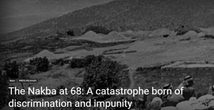
Palestinian refugees and internally displaced persons (approximately 66% of Palestinian population worldwide) enter the 69th year of forced displacement from, and within, their ancestral homeland, Israel continues to create intolerable living conditions which further swell the number of displaced Palestinians.Report By The Palestinian Centre For Human Rights
This ongoing Nakba (‘catastrophe’) is perpetuated through Israel’s denial of the Palestinian refugees’ Right of Return, the right to self-determination, and various other Israeli policies, which give rise to forced displacement of Palestinians, including forcible transfer and deportation, as grave breaches of international law.
These policies are framed within the wider gamut of perpetual human rights violations being committed by Israel on both sides of the green line, across the entirety of the occupied Palestinian territory and Israel.
Inside occupied East Jerusalem and so-called ‘Area C’ (accounting for more than 60% of occupied West Bank land), Israel pursues with complete impunity a policy of forcible transfer of Palestinians by way of – inter alia – unlawful land appropriation, home demolitions, denial of residency, restrictions on land access, and extensive settlement expansion.
Further, Palestinian residents of these areas are subject to systematic discrimination, harassment and violence perpetrated by Israeli settlers and security services alike, producing a highly coercive environment in which Palestinians are often left with little option but to leave their homes and communities.
Meanwhile, the Gaza Strip and its residents – some 80% of which are registered refugees – are plunged further into humanitarian crisis, choked by Israel’s ongoing punitive closure of this enclave which prevents desperately needed recovery following multiple rounds of Israeli military assault.
As a result, many tens of thousands of Palestinians remain internally-displaced within the Gaza Strip, living in inhuman conditions and with no end to their displacement in sight.
This widespread Palestinian suffering is not limited to the borders of Mandate Palestine, however, but also extends to the almost 6.2 million individuals (approximately 49% of Palestinians) who make up the international Palestinian Shatat (Diaspora).
Of particular concern is the fate of those in Syria, with the United Nations Relief and Works Agency in the Near East (UNRWA) finding that half a million Palestinian refugees have been directly affected by the unchecked violence of the ongoing armed conflict.
More than 60% of these refugees have now experienced multiple phases of displacement inside and outside Syria. Moreover, those refugees who have been forced to seek safety in other states are subjected to either non-recoupment or discrimination by countries of third refuge.
The plight of Palestinian refugees is compounded by structural failings within the very systems which are intended to afford these refugees protection. Palestinian refugees are victims of a grievous protection gap; regularly denied protection under the 1951 Refugee Convention on account of consistent misinterpretation of Article 1D by the domestic courts of state signatories.
This provision entitles Palestinian refugees to full protection under the Convention in the event that they are unable to avail themselves of protection or assistance from a dedicated UN agency other than the United Nations High Commissioner for Refugees (UNHCR), yet no UN agency is currently providing legal protection, including the seeking of a durable solution, to this displaced population.
The United Nations Conciliation Commission for Palestine (UNCCP), established with the purpose of seeking a just and durable solution to the Palestinian refugee question, has now lain effectively dormant for more than half a century, thus depriving Palestinian refugees of a UN agency mandated with the provision of legal protection.
UNRWA, which is mandated with affording humanitarian protection/assistance to Palestinian refugees living in its five operational areas only, is unable to fill this lacuna on account of chronic funding issues and a mandate which, in its present form, does not incorporate legal protection or the pursuit of an end to the ongoing exile of this displaced population.
However, too often domestic courts have employed an overly simplistic interpretation which assumes protection to be present merely by virtue of a Palestinian refugee residing in an area subject to UNRWA’s jurisdiction.
This untenable situation must be addressed as a matter of urgency, but also highlights the necessity of implementing a durable solution for Palestinian refugees in accordance with international law, specifically United Nations General Assembly resolution 194 of 1948, and United Nations Security Council resolution 237 of 1967.
This, in turn, can likely only be achieved through the presence of a fully-functioning and fully-supported agency dedicated to pursuing such a solution.
Thus, there exists a clear and pressing need to either revive UNCCP, to completely integrate Palestinian refugees into the scope of UNHCR mandate, or to officially extend UNRWA’s existing mandate – both in its core content and geographic scope, as well as its funding base, so as to provide comprehensive protection to Palestinian refugees.
Failure to do so is to maintain a status quo where international protection is absent, with Palestinians condemned to a fate of acute hardship and further displacement.
Accordingly, we, the undersigned members of the Palestinian Human Rights Organizations Council, make the following recommendations:
This ongoing Nakba (‘catastrophe’) is perpetuated through Israel’s denial of the Palestinian refugees’ Right of Return, the right to self-determination, and various other Israeli policies, which give rise to forced displacement of Palestinians, including forcible transfer and deportation, as grave breaches of international law.
These policies are framed within the wider gamut of perpetual human rights violations being committed by Israel on both sides of the green line, across the entirety of the occupied Palestinian territory and Israel.
Inside occupied East Jerusalem and so-called ‘Area C’ (accounting for more than 60% of occupied West Bank land), Israel pursues with complete impunity a policy of forcible transfer of Palestinians by way of – inter alia – unlawful land appropriation, home demolitions, denial of residency, restrictions on land access, and extensive settlement expansion.
Further, Palestinian residents of these areas are subject to systematic discrimination, harassment and violence perpetrated by Israeli settlers and security services alike, producing a highly coercive environment in which Palestinians are often left with little option but to leave their homes and communities.
Meanwhile, the Gaza Strip and its residents – some 80% of which are registered refugees – are plunged further into humanitarian crisis, choked by Israel’s ongoing punitive closure of this enclave which prevents desperately needed recovery following multiple rounds of Israeli military assault.
As a result, many tens of thousands of Palestinians remain internally-displaced within the Gaza Strip, living in inhuman conditions and with no end to their displacement in sight.
This widespread Palestinian suffering is not limited to the borders of Mandate Palestine, however, but also extends to the almost 6.2 million individuals (approximately 49% of Palestinians) who make up the international Palestinian Shatat (Diaspora).
Of particular concern is the fate of those in Syria, with the United Nations Relief and Works Agency in the Near East (UNRWA) finding that half a million Palestinian refugees have been directly affected by the unchecked violence of the ongoing armed conflict.
More than 60% of these refugees have now experienced multiple phases of displacement inside and outside Syria. Moreover, those refugees who have been forced to seek safety in other states are subjected to either non-recoupment or discrimination by countries of third refuge.
The plight of Palestinian refugees is compounded by structural failings within the very systems which are intended to afford these refugees protection. Palestinian refugees are victims of a grievous protection gap; regularly denied protection under the 1951 Refugee Convention on account of consistent misinterpretation of Article 1D by the domestic courts of state signatories.
This provision entitles Palestinian refugees to full protection under the Convention in the event that they are unable to avail themselves of protection or assistance from a dedicated UN agency other than the United Nations High Commissioner for Refugees (UNHCR), yet no UN agency is currently providing legal protection, including the seeking of a durable solution, to this displaced population.
The United Nations Conciliation Commission for Palestine (UNCCP), established with the purpose of seeking a just and durable solution to the Palestinian refugee question, has now lain effectively dormant for more than half a century, thus depriving Palestinian refugees of a UN agency mandated with the provision of legal protection.
UNRWA, which is mandated with affording humanitarian protection/assistance to Palestinian refugees living in its five operational areas only, is unable to fill this lacuna on account of chronic funding issues and a mandate which, in its present form, does not incorporate legal protection or the pursuit of an end to the ongoing exile of this displaced population.
However, too often domestic courts have employed an overly simplistic interpretation which assumes protection to be present merely by virtue of a Palestinian refugee residing in an area subject to UNRWA’s jurisdiction.
This untenable situation must be addressed as a matter of urgency, but also highlights the necessity of implementing a durable solution for Palestinian refugees in accordance with international law, specifically United Nations General Assembly resolution 194 of 1948, and United Nations Security Council resolution 237 of 1967.
This, in turn, can likely only be achieved through the presence of a fully-functioning and fully-supported agency dedicated to pursuing such a solution.
Thus, there exists a clear and pressing need to either revive UNCCP, to completely integrate Palestinian refugees into the scope of UNHCR mandate, or to officially extend UNRWA’s existing mandate – both in its core content and geographic scope, as well as its funding base, so as to provide comprehensive protection to Palestinian refugees.
Failure to do so is to maintain a status quo where international protection is absent, with Palestinians condemned to a fate of acute hardship and further displacement.
Accordingly, we, the undersigned members of the Palestinian Human Rights Organizations Council, make the following recommendations:
- That the international community takes all measures to ensure Israel’s compliance with its obligations under IHL and IHRL and calls on Israel to cease those policies and practices which adversely affect the protected population.
- The international community is thus reminded that forcible transfer and deportation amount to grave breaches of IHL and, as such, States must not recognize the ensuing situation as lawful, nor render aid or assistance in maintaining the situation. The international community should further call for immediate cessation of such activities and seek guarantees of non-repetition and reparations;
- That the international community, including third party states, regional bodies and other relevant actors, genuinely strives to secure international protection – including durable solutions – for Palestinian refugees, and primarily, their Right of Return and to self-determination;
- That UN agencies and bodies, including UNRWA and UNHCR, take all available measures to close the legal protection gap suffered by Palestinian refugees, including lobbying for the consistent and just interpretation of Article 1D of the 1951 Refugee Convention by domestic courts;
- That the Palestinian Authority and the Palestinian Liberation Organization make concerted efforts to press concerned states and international agencies to meet their responsibilities, particularly with a view to fulfilling their obligations relating to non-refoulment, and non-discrimination.
